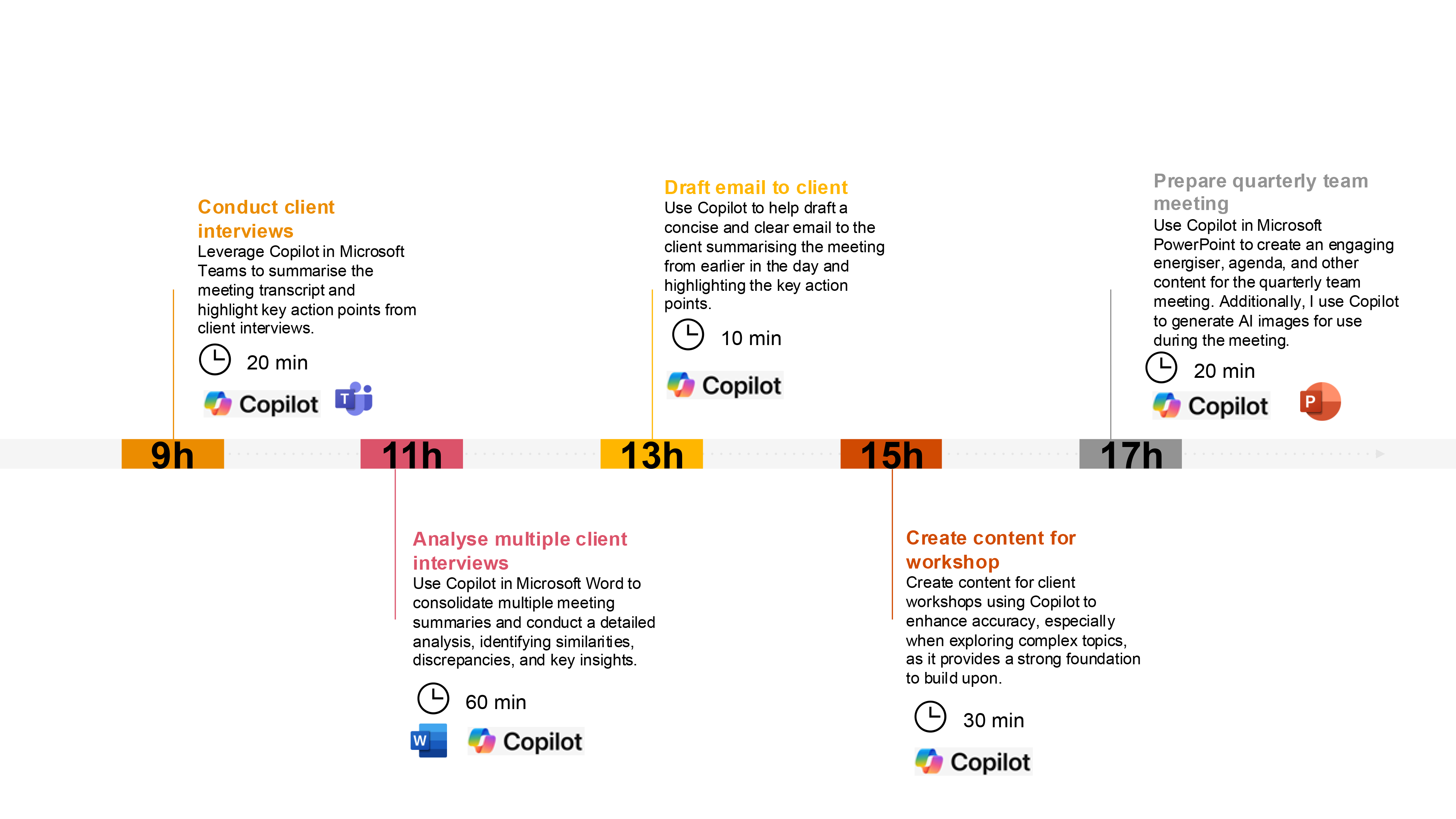
Understanding Copilot
Microsoft 365 Copilot is an AI-powered assistant designed to streamline daily tasks by integrating directly into Microsoft applications like Word, Excel, Outlook and Teams, as well as functioning as a standalone chatbot. It helps users draft emails, summarise documents, generate reports, analyse data, find information and more, making everyday work more efficient and manageable.
You can interact with M365 Copilot naturally, much like asking a colleague for help. Whether you need answers to questions, assistance with a task or help structuring your day, Copilot processes your request and delivers relevant insights using its vast data access. Additionally, M365 Copilot allows users to create custom AI agents, enabling tailored automation for specific tasks and workflows.
At the core of M365 Copilot’s functionality is the prompt; the instruction you give. The clearer and more precise your prompt, the better M365 Copilot’s response will be. Over time, it adapts to your needs, continuously improving the support it provides.
M365 Copilot is part of a broader trend where AI-driven copilots are becoming embedded in business applications beyond Microsoft 365. For example, similar functionalities are being integrated into CRM systems like Salesforce and Dynamics 365, ERP systems like SAP and D365, and HRIS platforms. These AI-driven assistants will continue to shape the day-to-day tasks of employees, enhancing productivity and decision-making across various business functions.
Advantages of implementing M365 Copilot
When used effectively, M365 Copilot can drive significant productivity gains. By automating routine tasks, it allows employees to focus on more strategic and creative work. This boost in efficiency streamlines workflows, minimises time spent on repetitive tasks and enhances overall work quality. In fact, a recent Microsoft report (2024) highlights its impact across different organisations: 60% of Copilot users reported an improvement in work quality, employees were able to save up to five hours per week and auditors increased productivity by 80% with Copilot.
Moreover, M365 Copilot’s advanced data analysis capabilities offer valuable insights that enable faster, more informed decision making. By helping organisations make smarter decisions, M365 Copilot fosters a more innovative, high-performing environment. Over 85% of Fortune 500 companies are already leveraging Microsoft AI solutions, including Copilot, signaling that access to cutting-edge tools is rapidly becoming a critical differentiator in attracting top talent and maintaining competitiveness (Microsoft, 2025).
Challenges of integration
While the benefits are clear, integrating M365 Copilot into workflows isn’t without its challenges. To fully maximise its potential, organisations must address the following:
Developing the right skills
A major challenge employees face when using M365 Copilot is developing the necessary skills to effectively interact with AI. It’s not enough to simply know how to use the tool; employees need to be able to craft clear, effective prompts to guide it, and they must also know how to assess the responses it generates. Without these skills, the output may not be helpful or accurate, potentially slowing down productivity instead of boosting it. Other skills are necessary too, such as having a digital mindset, the ability to think critically, etc.
Anticipating and managing change
Introducing M365 Copilot can spark resistance as employees are encouraged to integrate AI into decision-making processes. Many individuals are accustomed to traditional workflows and may feel uneasy about incorporating AI into their daily tasks. To ease this transition, it’s crucial to demonstrate how M365 Copilot can lead to more efficient and data-driven decisions, ultimately helping employees make more informed choices. By positioning AI as a trusted advisor that augments decision making, employees will feel more confident adopting this tool.
Addressing job security concerns
A common fear with AI tools is that they’ll eventually replace certain jobs. While M365 Copilot is designed to assist rather than replace, employees may still worry about their long-term role. Transparent communication is key, leaders should emphasise that M365 Copilot is meant to enhance human expertise and enable people to focus on more meaningful, strategic work.
Ensuring security and confidentiality
As AI tools become more integrated into workflows, security concerns must be addressed. M365 Copilot generates responses using both enterprise data and online sources, which means that users must be mindful of where information comes from and how it is shared. Employees need to develop an awareness of security risks, such as verifying the confidentiality of documents before using AI-generated content and ensuring information is shared only with the right stakeholders. Security is not just a technical issue; it’s a people challenge that requires fostering a culture of awareness and responsibility.
Enabling successful integration
To overcome these challenges and fully harness M365 Copilot’s potential, organisations need to invest in their most valuable asset: Their people. A clear strategy centred on upskilling can make all the difference. This approach involves but isn’t limited to:
1. Tailored training and support programme
Provide comprehensive training on M365 Copilot’s features, including how to craft effective prompts and critically assess AI outputs.
2. Continuous feedback and leadership engagement
Establish regular feedback loops to understand user experience, and encourage leaders to champion the tool, fostering a sense of ownership across teams.
3. Clear and transparent communication
Communicate clearly that M365 Copilot is here to enhance human expertise, not to replace it. This helps address any job security concerns and clarifies its practical benefits.

4. Cultivating a culture of continuous learning and adaptation
Implement regular learning sessions and share success stories. Recognising and rewarding effective AI usage can further embed digital skills within the organisation.
5. Effective change management
Use structured change management strategies to help teams adjust smoothly during the transition, making sure that challenges are addressed promptly as the technology evolves.
Bringing M365 Copilot into everyday work
At PwC, we’re not just advising organisations on AI and helping them implement advanced solutions, we’re also using AI ourselves. Across our teams, M365 Copilot is already changing the way we work, whether it’s helping consultants summarise reports in seconds, draft insights for clients and streamline complex data analysis. It’s not about replacing human expertise, but about giving our people more time to focus on what really matters, solving problems, driving impact and working smarter.
Here’s a snapshot of how an employee can embed M365 Copilot into their daily workflows:
A day in the life of a PwC consultant


Looking ahead
With M365 Microsoft Copilot, there’s a genuine opportunity to reshape the way work is done. However, realising its potential hinges on equipping employees with the necessary skills to work effectively with AI. With the right upskilling initiatives and a supportive organisational culture, M365 Copilot can become a valued partner in the modern workplace.
PwC has the expertise and experience to guide clients through this transformative journey. Discover more about our service offerings and learn how to navigate this transition.
Artificial intelligence that drives real impact
Organisational upskilling and change
People & Transformation
Empower your workforce and let your business thrive
Contact us













